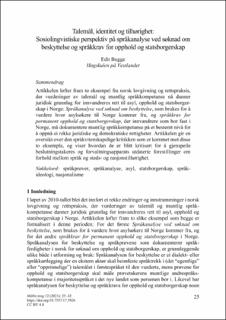| dc.contributor.author | Bugge, Edit | |
| dc.date.accessioned | 2022-02-14T14:24:45Z | |
| dc.date.available | 2022-02-14T14:24:45Z | |
| dc.date.created | 2021-12-17T10:04:21Z | |
| dc.date.issued | 2021 | |
| dc.identifier.citation | Bugge, E. (2021). Talemål, identitet og tilhørighet: Sosiolingvistiske perspektiv på språkanalyse ved søknad om beskyttelse og språkkrav for opphold og statsborgerskap. Målbryting, (12), 25-42. | en_US |
| dc.identifier.issn | 1500-8576 | |
| dc.identifier.uri | https://hdl.handle.net/11250/2978888 | |
| dc.description.abstract | Artikkelen løfter fram to eksempel fra norsk lovgivning og rettspraksis, der vurderinger av talemål og muntlig språkkompetanse nå danner juridisk grunnlag for innvandreres rett til asyl, opphold og statsborgerskap i Norge: Språkanalyse ved søknad om beskyttelse, som brukes for å vurdere hvor asylsøkere til Norge kommer fra, og språkkrav for permanent opphold og statsborgerskap, der innvandrere som bor fast i Norge, må dokumentere muntlig språkkompetanse på et bestemt nivå for å oppnå ei rekke juridiske og demokratiske rettigheter. Artikkelen gir en oversikt over den språkvitenskapelige kritikken som er kommet mot disse to eksempla, og viser hvordan de er blitt kritisert for å gjenspeile beslutningstakeres og forvaltningsapparats utdaterte forestillinger om forhold mellom språk og steds- og nasjonstilhørighet. | en_US |
| dc.description.abstract | During the 2010s, a series of changes were introduced in Norwegian legislation and case law, in which the assessments of spoken language competence are used as legal evidence or documentation in the questions of immigrants' rights to asylum, residence and citizenship in Norway. This paper highlights two such examples: Language analysis in connection with application for protection, which is used to assess the origin of asylum seekers, and the introduction of language requirements for permanent residence and citizenship, where immigrants living permanently in Norway are now required to document oral language skills at a certain level in order to obtain a number of legal and democratic rights. The article provides an overview of the criticisms of these two examples from various fields of linguistics and applied linguistics and shows how the examples have been criticized, both in academic literature and public debate, of reflecting decision-makers' outdated views about linguistic variation and change, language acquisition and belonging, and outdated views about the relation between language, nation, ethnicity and geographical space. | en_US |
| dc.language.iso | nob | en_US |
| dc.publisher | Septentrio Academic Publishing | en_US |
| dc.rights | Navngivelse 4.0 Internasjonal | * |
| dc.rights.uri | http://creativecommons.org/licenses/by/4.0/deed.no | * |
| dc.title | Talemål, identitet og tilhørighet: Sosiolingvistiske perspektiv på språkanalyse ved søknad om beskyttelse og språkkrav for opphold og statsborgerskap | en_US |
| dc.title.alternative | Spoken language, identity and belonging: Sociolinguistic perspectives on LADO tests and language requirements for permanent residence and citizenship in Norway | en_US |
| dc.type | Peer reviewed | en_US |
| dc.type | Journal article | en_US |
| dc.description.version | publishedVersion | en_US |
| dc.rights.holder | © 2021 Edit Bugge | en_US |
| dc.source.pagenumber | 25-42 | en_US |
| dc.source.journal | Målbryting | en_US |
| dc.source.issue | 12 | en_US |
| dc.identifier.doi | 10.7557/17.5926 | |
| dc.identifier.cristin | 1969769 | |
| dc.relation.project | Norges forskningsråd: 315046 | en_US |
| cristin.ispublished | true | |
| cristin.fulltext | original | |
| cristin.qualitycode | 1 | |

